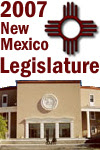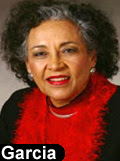 A package of ethics reform proposals that comes largely from the recommendations of the governor’s task force could be introduced as early as Wednesday, and Rep. Mary Helen Garcia will be the House sponsor of the bill that would create a state ethics commission.
A package of ethics reform proposals that comes largely from the recommendations of the governor’s task force could be introduced as early as Wednesday, and Rep. Mary Helen Garcia will be the House sponsor of the bill that would create a state ethics commission.
Garcia, a Las Cruces Democrat, had fought for the commission to have disciplinary powers that include the ability to fine, censure and reprimand public officials, state employees, lobbyists and contractors – the same recommendations made by Gov. Bill Richardson – but the bill that will be introduced will not give the commission that authority.
Garcia said the proposed legislation is a compromise that came out of a meeting of some House Democratic caucus members. She said she fought for disciplinary powers, but lost.
 “Hopefully this will at least begin to address the situation, and if it proves to not be strong enough, then in years to come, maybe we can add language to it,” Garcia said.
“Hopefully this will at least begin to address the situation, and if it proves to not be strong enough, then in years to come, maybe we can add language to it,” Garcia said.
The governor’s office had no immediate comment.
The commission would be given investigatory powers that include the ability to issue subpoenas, so it would in some ways be similar to the state’s Judicial Standards Commission, which investigates allegations of misconduct against judges and makes disciplinary recommendations to the New Mexico Supreme Court.
The ethics commission’s recommendations would be made to different agencies depending on who it is investigating. For example, the results of an investigation of a House member would be forwarded to the House Rules and Order of Business Committee. Recommendations stemming from an investigation of a state employee might be made to that employee’s agency or the attorney general’s office, depending on the findings.
House Majority Leader Ken Martinez, D-Grants and a member of the governor’s ethics reform task force, confirmed that the ethics commission bill is one of as many as seven that will be introduced as early as Wednesday. The package of ethics-reform bills come from the recommendations of the governor’s task force, the governor’s own recommendations and negotiations with other legislators, he said, and are still being tweaked.
The bills will deal with the creation of a legislative expense fund, changes to the Governmental Conduct Act, a gift ban, public financing of campaigns and campaign contribution limits. With the exception of the ethics commission bill, specifics weren’t released.
“It includes everything that came out of the commission. It includes some tweaking to get buy-in from members,”
The governor also wants limits on campaign contributions to statewide candidates of $2,300 per individual or political action committee, per election cycle – matching the federal limit – and $1,150 for Public Regulation Commission candidates and those running for legislative and district judgeship seats.
In addition,
If a candidate opts in but an opponent does not, the publicly financed candidate receives funds that roughly match the opponent’s.